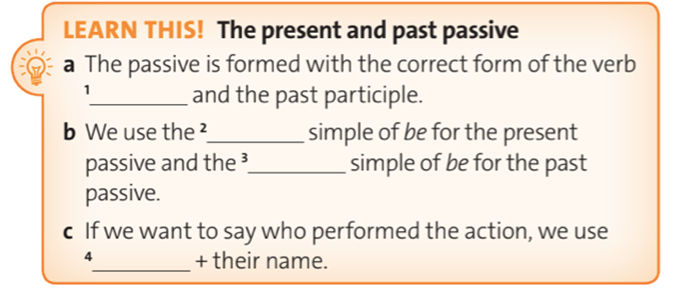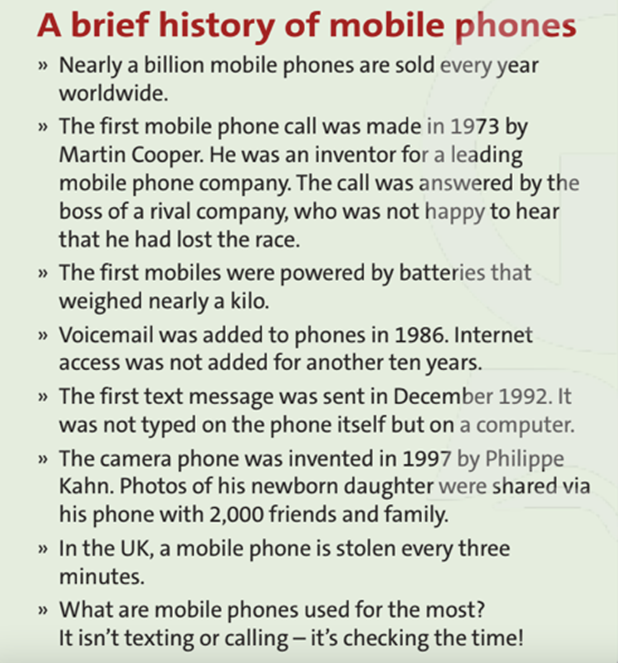Câu hỏi:
16/07/2024 153
Speaking. Work in pairs. How many different things do people use mobile phones for? Think of as many as you can in two minutes. (Nói. Làm việc theo cặp. Mọi người sử dụng điện thoại di động cho bao nhiêu việc khác nhau? Nghĩ ra nhiều việc nhất có thể trong vòng hai phút)
Speaking. Work in pairs. How many different things do people use mobile phones for? Think of as many as you can in two minutes. (Nói. Làm việc theo cặp. Mọi người sử dụng điện thoại di động cho bao nhiêu việc khác nhau? Nghĩ ra nhiều việc nhất có thể trong vòng hai phút)
Trả lời:
 Giải bởi Vietjack
Giải bởi Vietjack
Gợi ý:
- call / text messages (gọi điện / nhắn tin) / go online (lên mạng) / search information (tìm kiếm thông tin) / take photos (chụp ảnh) / listen to music (nghe nhạc) / chat with friends (chat với bạn).

Gợi ý:
- call / text messages (gọi điện / nhắn tin) / go online (lên mạng) / search information (tìm kiếm thông tin) / take photos (chụp ảnh) / listen to music (nghe nhạc) / chat with friends (chat với bạn).

CÂU HỎI HOT CÙNG CHỦ ĐỀ
Câu 1:
Complete the questions about the reading texts in Units 1-7 using the correct passive form of the verbs in brackets. (Hoàn thành các câu hỏi về bài đọc trong các bài 1-7 bằng cách sử dụng dạng bị động đúng của các động từ trong ngoặc)
1. Why _____ Ashlyn Blocker _____ (watch) more carefully than all the other children at her school? [1F]
2. _____ Dan and Kate Suski _____ (rescue) by helicopter after their boat sank? [2F]
3. What skills _____ (improve) by playing online video games, according to a report? [3F]
4. Who _____ (nearly / kill) by a storm at a paragliding event? [4F]
5. Where _____ Andrew Johnson _____ (employ) as a Master Model Builder? [5F]
6. Where _____ meetings_____ (sometimes / hold) if Aaron Levie is choosing the venue? [6F]
7. What _____ Hillary Bradt _____ (show) to do on her holiday? [7F]
Complete the questions about the reading texts in Units 1-7 using the correct passive form of the verbs in brackets. (Hoàn thành các câu hỏi về bài đọc trong các bài 1-7 bằng cách sử dụng dạng bị động đúng của các động từ trong ngoặc)
1. Why _____ Ashlyn Blocker _____ (watch) more carefully than all the other children at her school? [1F]
2. _____ Dan and Kate Suski _____ (rescue) by helicopter after their boat sank? [2F]
3. What skills _____ (improve) by playing online video games, according to a report? [3F]
4. Who _____ (nearly / kill) by a storm at a paragliding event? [4F]
5. Where _____ Andrew Johnson _____ (employ) as a Master Model Builder? [5F]
6. Where _____ meetings_____ (sometimes / hold) if Aaron Levie is choosing the venue? [6F]
7. What _____ Hillary Bradt _____ (show) to do on her holiday? [7F]Câu 2:
Read the Look out! box. Complete the sentences with the present simple or past simple passive of the verbs in brackets. (Đọc bảng Chú ý. Hoàn thành các câu sau với bị động ở thì hiện tại hoặc quá khứ)

1. Mobile phones are owned (own) by about 4.3 billion people in the world today.
2. The best-selling phone ever was the Nokia 1100. More than 250 million _____ (sell).
3. In Japan, mobiles _____ (often / use) in the shower, so most of them are waterproof.
4. The average text message _____ (usually / answer) within 90 seconds.
5. Today, the internet _____ (access) more often from a phone than from a computer.
6. More text messages _____ (send) every year in the Philippines than in any other country.
Read the Look out! box. Complete the sentences with the present simple or past simple passive of the verbs in brackets. (Đọc bảng Chú ý. Hoàn thành các câu sau với bị động ở thì hiện tại hoặc quá khứ)

1. Mobile phones are owned (own) by about 4.3 billion people in the world today.
2. The best-selling phone ever was the Nokia 1100. More than 250 million _____ (sell).
3. In Japan, mobiles _____ (often / use) in the shower, so most of them are waterproof.
4. The average text message _____ (usually / answer) within 90 seconds.
5. Today, the internet _____ (access) more often from a phone than from a computer.
6. More text messages _____ (send) every year in the Philippines than in any other country.
Câu 3:
Speaking. Work in pairs. Ask and answer the questions in exercise 6. (Nói. Làm việc theo nhóm. Hỏi và trả lời các câu hỏi trong bài tập 6)
Speaking. Work in pairs. Ask and answer the questions in exercise 6. (Nói. Làm việc theo nhóm. Hỏi và trả lời các câu hỏi trong bài tập 6)
Câu 4:
Study the first two sentences of the text in exercise 2. Then complete the Learn this! box. (Nghiên cứu hai câu đầu tiên của đoạn văn trong bài tập 2. Sau đó hoàn thành bảng Learn this)

Study the first two sentences of the text in exercise 2. Then complete the Learn this! box. (Nghiên cứu hai câu đầu tiên của đoạn văn trong bài tập 2. Sau đó hoàn thành bảng Learn this)

Câu 5:
Find twelve examples of the passive in the text. Which examples are a) plural, b) negative or c) a question? (Tìm mười hai ví dụ về bị động trong văn bản. Những ví dụ nào là a) số nhiều, b) phủ định hoặc c) câu hỏi?)
Find twelve examples of the passive in the text. Which examples are a) plural, b) negative or c) a question? (Tìm mười hai ví dụ về bị động trong văn bản. Những ví dụ nào là a) số nhiều, b) phủ định hoặc c) câu hỏi?)
Câu 6:
Read the text. What happened in 1973, 1986, 1992 and 1997? (Đọc đoạn văn. Chuyện gì đã xảy ra vào năm 1973, 1986, 1992 và 1997)

Read the text. What happened in 1973, 1986, 1992 and 1997? (Đọc đoạn văn. Chuyện gì đã xảy ra vào năm 1973, 1986, 1992 và 1997)



